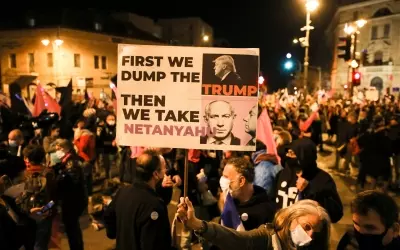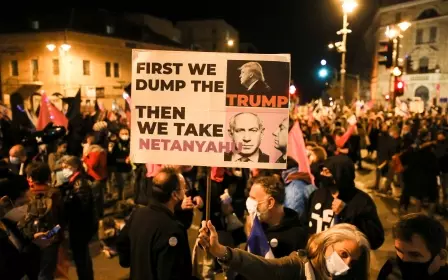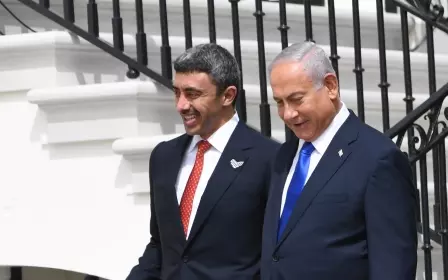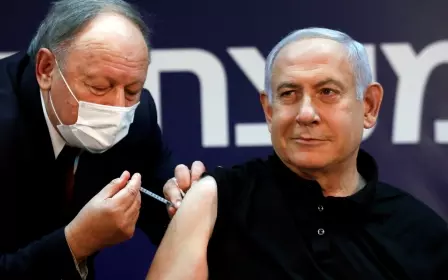Israel's Netanyahu pleads not guilty to corruption weeks before election
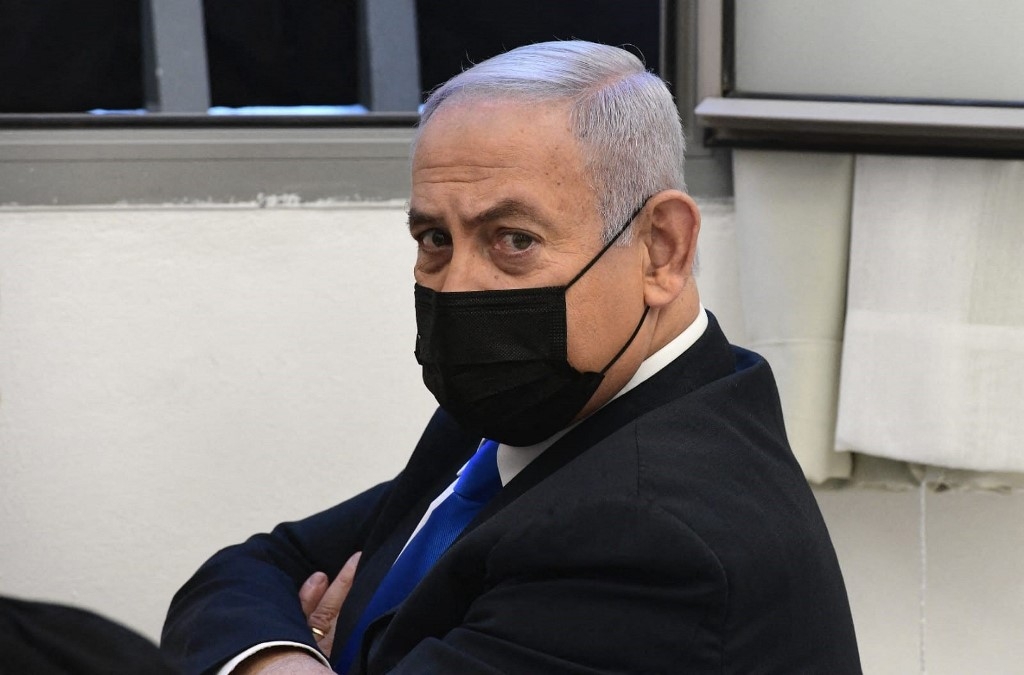
Israel's Prime Minister Benjamin Netanyahu on Monday pleaded not guilty to corruption as he attended his long-awaited trial in Jerusalem six weeks before legislative elections.
A planned court appearance last month was adjourned due to new restrictions associated with the third Covid-19 lockdown imposed in December.
Netanyahu's trial for bribery, fraud and breach of trust began last May, with the premier being excused from subsequent hearings as his lawyers argued for more time to review prosecution evidence.
Netanyahu's corruption cases
+ Show - HideIsraeli Prime Minister Benjamin Netanyahu is facing potential charges in three cases focused on corruption, known by their codes 4000, 1000 and 2000.
Case 4000: Netanyahu accused of granted regulatory favours to Israel's leading telecommunications company, Bezeq Telecom Israel, in return for positive coverage of him and his wife Sara on a news website controlled by the company's former chairman.
Case 1000: Netanyahu and his wife allegedly wrongfully received gifts from Israeli filmmaker Arnon Milchan and Australian billionaire businessman James Packer, including champagne and cigars.
Case 2000: Netanyahu suspected of negotiating a deal with the owner of Israel's best-selling daily newspaper, Yedioth Ahronoth, for better coverage in return for legislation that would slow the growth of a rival daily newspaper.
The Israeli prime minister appeared in court on Monday for the presentation of his formal response to the charges.
"I confirm the written answer submitted in my name," Netanyahu said, standing before the three-judge panel in the heavily guarded Jerusalem District Court.
New MEE newsletter: Jerusalem Dispatch
Sign up to get the latest insights and analysis on Israel-Palestine, alongside Turkey Unpacked and other MEE newsletters
He was referring to a document his lawyers gave the court last month in which they argued that Netanyahu was not guilty of the three charges.
Wearing a coronavirus mask, Netanyahu seemed intent on projecting an air of business as usual, thanking the court and leaving without explanation some 20 minutes into the session.
On entering the courtroom, Netanyahu sat in a corner with his lawyers, his back to cameras. The session itself was not broadcast but reporters could monitor a closed-circuit feed elsewhere in the building, according to Reuters.
His quick departure from the court building seemed aimed at showing the public that he would not allow the trial to interfere with government business as Israel begins to emerge from a month-long coronavirus lockdown.
At the session, Netanyahu sat, arms crossed, and coughed occasionally into his mask, before taking it off to sip water, Reuters said.
This marks the last pre-trial hearing with upcoming sessions focused on testimony and evidence.
Netanyahu, 71, is the first Israeli premier to be indicted in office. He has denied the charges brought against him as "fabricated and ludicrous".
He could face a maximum sentence of 10 years in prison if he is found guilty of bribery, and three years in prison for fraud and breach of trust.
The trial comes a day after the country started to ease its third coronavirus lockdown amid an aggressive vaccination campaign.
Since December, more than 3.4 million of Israel's nine million people have received a coronavirus vaccine jab in what is seen as the world's fastest per-capita campaign, though Palestinians living in the occupied territories have been left out of the vaccine roll-out.
Despite the inoculations, Israel has been registering a daily average of 6,500 new Covid-19 cases, down from around 8,000 in mid-January.
A strict nationwide lockdown in force since 27 December was extended four times to combat the infection rate, but January was the deadliest month yet, with more than 1,000 Covid fatalities.
Netanyahu has been facing weekly protests calling on him to resign over the corruption charges and his mishandling of the coronavirus pandemic.
Re-election chances
The longest-serving prime minister in Israeli history, Netanyahu says the charges against him - filed by his hand-picked attorney general - are part of a witch-hunt to drive him from office.
The trial schedule may force Netanyahu to appear in court multiple times a week, as he campaigns ahead of Israel's fourth election in less than two years to be held on 23 March.
It remains unclear whether the timing of the trial will hurt the premier's re-election chances in March.
Israel's parliament speaker and Netanyahu loyalist Yariv Levin insisted the court must "postpone" the trial's upcoming phase.
Proceeding now "will be lending a hand to blatant meddling in the elections", he told the right-wing Israel Hayom newspaper on Sunday.
Levin charged that it was unfair for the prosecution to present its case during the election campaign, while the defence rebuttals are scheduled for after election day.
Several recent polls show that Netanyahu's right-wing Likud remains the strongest party by a comfortable margin, but other polls showed that a prominent Likud defector, Gideon Saar, has more chances to form a government.
Middle East Eye delivers independent and unrivalled coverage and analysis of the Middle East, North Africa and beyond. To learn more about republishing this content and the associated fees, please fill out this form. More about MEE can be found here.


